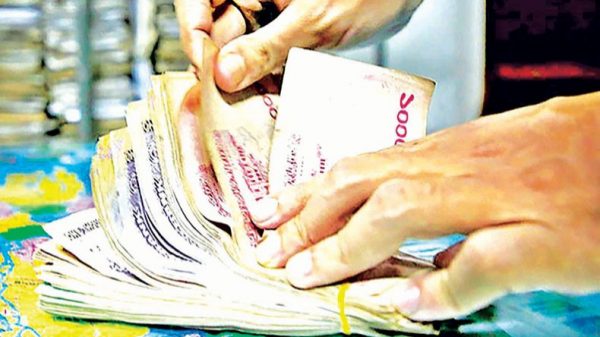Bangladesh’s foreign debt repayment mounts as taka devalues

Shawdesh Desk
The devaluation of the local currency against the US dollar is going to render the country’s interest payment against the foreign loans costly by more than Tk 2,000 crore in the outgoing financial year, said officials.
Economists noted that the maturity of many short-term loans, taken by the present government from bilateral countries for development projects, was another reason for the sharp upward trend in overall foreign debt repayment in recent years, posing challenges amid a slow revenue generation.
The Economic Relations Division has calculated that Tk 9,322 crore would be required to clear the interest payment against foreign loans in FY23 as per a revised projection, said finance ministry officials.
They said that the original allocation for the payment of interest on foreign loans was Tk 7,200 crore in the outgoing financial year.
The ERD has already asked the Finance Division for allocating an extra Tk 2,122 crore in FY23 that will end on June 30, they further said.
In FY22, some Tk 4,224 crore was required to clear the interest payment against overseas borrowings. Officials attributed the unwanted situation to the sharp devaluation of the local currency against the US greenback.
One dollar has been exchanged at Tk 107 recently compared to Tk 86 about a year ago because of the prolonged shortage of dollars amid the continuous fall foreign currency reserves over the past 22 months.
Alone in the current financial year, the Bangladesh Bank has increased the exchange rate of dollar against the local currency on 15 occasions with the latest increase made on May 2.
The forex reserves now hover in the neighbourhood of $30 billion, down from an all-time high of $48 billion in August 2021, mainly for the high import expenditures.
The government has, meanwhile, signed an agreement with the International Monetary Fund for a $4.7 billion dollar credit package over the next three years to overcome the forex reserves crisis.
The ERD in its projection said that the amount of interest payment against foreign loans would grow further to Tk 12,376 crore in FY24.
Policy Research Institute executive director Ahsan H Mansur said that the maturity of many short-term loans was also contributing to the quick rise in debt repayment.
Such loans are called non-concessional loans, he noted.
The Standing Committee on Non-Concessional Loan, headed by the finance minister, approved 65 proposals for such loans between 2013 and 2021, according to an ERD report.
In 2017, a $14.3 billion non-concessional loan was mobilised, which was 79.62 per cent of the total loans committed by multilateral and bilateral lenders that year.
In most cases, such loans carry a grace period of five years for repayment.
In 2018, Tk 4,688.26 crore, equivalent to some $500 million, was borrowed from China to implement the Single Point Mooring with Double Pipe Line project in Cox’s Bazar.
The five-year grace period of the loan ended in the past month.
The debt repayment would remain high in the coming days as the loans for some high-value foreign funded projects will mature in the coming days.
The Roopur Nuclear Power Plant is one of them, said former World Bank Dhaka Office chief economist Zahid Hussain.
The debt repayment for the RNPP, the country’s first nuclear power plant being built with a $11.38 billion foreign loan, will start in March 2027 when the first instalment of the principal amount will have to be paid back on conclusion of the10-year grace period.
According to economists, the government needs to generate more revenue income compared to the current slow trend to maintain a foreign debt repayment without any problem.
They viewed that export earnings and the inflow of remittance also needed to be steady for preventing the devaluation of the local currency.
They, however, noted that both the export income and remittance were not satisfactory in recent months.
The export income, which accounts for almost 70 per cent of the forex reserves, recorded negative growth for the second consecutive month in April.
In April, the export income declined by 16.52 per cent to $3.95 billion from $4.74 billion in 12 months as the western economies are facing turmoil due to the Russia-Ukraine war and consumers are spending more for buying food, medicine and other daily essentials.
On the other hand, the remittance inflow, which helps the country’s balance of payment stay healthy, dropped by more than 19 per cent in April.























Leave a Reply